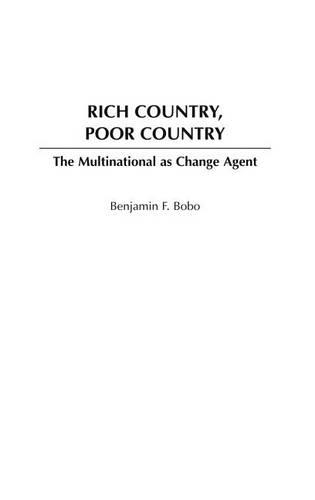
Rich Country, Poor Country: The Multinational as Change Agent
(Hardback)
Publishing Details
Rich Country, Poor Country: The Multinational as Change Agent
By (Author) Benjamin F. Bobo
Bloomsbury Publishing PLC
Praeger Publishers Inc
30th April 2005
United States
Classifications
Tertiary Education
Non Fiction
Politics and government
338.88
Physical Properties
Hardback
256
Description
Calls upon multinational corporations to use their power and enterprising abilities to overcome poverty in the Third World In this series of essays that span over twenty years of research, Benjamin Bobo builds the case for multinational corporations to take an active role in combating poverty around the world. Citing sobering statistics (for example, three quarters of the world's nations are classified as "Third World" and four-fifths of the world's people live in these nations), Bobo argues that huge corporate entities have not only the wherewithal but an obligation to alleviate the suffering that results from a lack of economic resources and opportunity. Through these provocative and forward-looking essays, he presents a theoretical and practical framework for multinationals to stimulate economic development in the Third World - providing access to capital, entrepreneurial expertise, and emerging technologies. In a bold challenge to conventional thinking about wealth creation and strategic decision-making, Bobo applies such concepts as profit satisficing and stakeholder givebacks, and proposes an agenda for change that begins in business schools (the intellectual training ground for multinational managers), with increased emphasis on sustainability and human development. The net result, he argues, will be a world in which both producers and consumers benefit. * Brings together a selection of the author's ground-breaking essays * Offers a provocative approach to the issues of globalisation and development
Reviews
Bobo (finance, Loyola Marymount U.) feels strongly that income inequality between rich and poor nations and the deep poverty of the Third World can be effectively addressed by the multinational corporation. He presents 14 previously published essays that address the matter from a variety of angles, discussing such matters as MNC-host country relationships in Africa, the possibilities of MNCS putting aside exploitative practices in recognition that poor countries may otherwise unite against them, the attitudes of policymakers in poor countries and in MNCs, the lessons from conflict and conflict resolution models, expanding the corporate model of wealth maximization to include Third World stakeholders, and the issue of a new pedagogy in support of such a model. * Reference & Research Book News *
Author Bio
BENJAMIN F. BOBO is Professor of Finance in the College of Business Administration at Loyola Marymount University in Los Angeles
